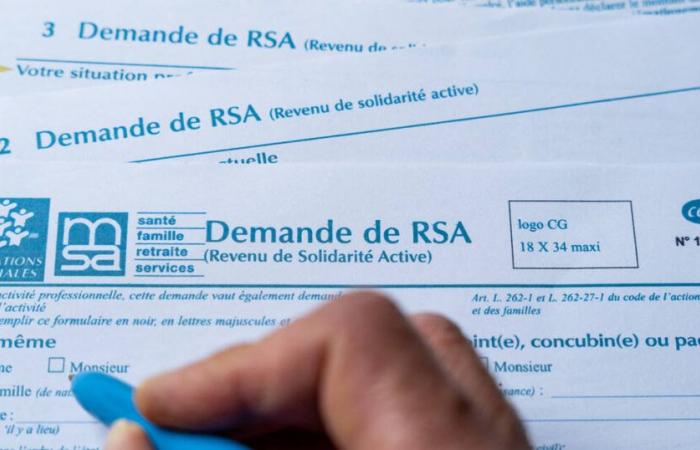
Recipients of active solidarity income, like all job seekers, must now commit to carrying out a certain number of hours of activity, which can also relate to professional training, application for job offers. employment or administrative procedures.
“Compulsory labor service”, “modern slavery”, “forced labour”. There is no shortage of expressions to decry, on social networks and at the microphones of several media outlets, a provision of the “full employment” law which becomes effective this month of January. Many commentators denounce a text which, according to them, requires RSA recipients to fifteen hours of weekly work in a community or company. “Nevertheless, the fifteen hours of forced labor outside of labor law for RSA beneficiaries is really crazy,” denounces, for example, an Internet user on
Voted in October 2023, it provides that all active solidarity income recipients and young people under the age of 25 registered with a local mission are preparing to be registered with France Travail, if they were not not yet. The law also includes, for all job seekers (and not exclusively RSA recipients), a “support” component. It takes the form of an “engagement contract” signed between a reference organization (France Travail, departmental council, etc.) and the person seeking employment. According to the law, the organization must ensure “support towards access or return to employment” of the applicant who, for his part, undertakes to carry out a weekly duration of activity “at least fifteen hours” – duration which, however, may be revised downwards in certain situations.
These hours of activity are not limited, as some Internet users and political commentators somewhat simplify, to compulsory work in a community or in a company. Article L5411-6 of the labor code, in force since January 1, provides that the activities requested in the support plan consist of “training, accompaniment and support actions”, in a very broad sense. “The law specifies that the activities included in the employment contract must have the social and professional integration of the person as their objective, but leaves the support representative to define with the beneficiary the activities adapted to the situation,” confirms France Travail with CheckNews. On its website, the public establishment specifies that these activities can for example take the form “actions to define your professional project and develop your skills”, such as «formations» or “the discovery of professions”, for example through a professional immersion course in a company (a system which has existed since 2014). “Job search actions” are also counted (applications for job offers, job search assistance workshops, interviews, etc.) and, more generally, “any other action related to its access to employment project”. But also by counting the time spent on administrative procedures “access to rights, health, housing, childcare…”
Failing to be able to list all the possible activities exhaustively, our contact at France Travail notes “only a first good indication of what a socio-professional support course may contain” may be the list of activities counted as part of the “youth engagement contracts” created in 2022 (activities presented on pages 9 to 11 of the CEJ implementation circular). For example, with regard to activities enabling “remove the obstacles to mobility” of this public, driving school hours were considered as hours of CEJ activity, “since mobility has been identified as a blocking point [à l’insertion dans l’emploi] during the diagnosis and that action in this direction has been prescribed as part of the action plan.
Volunteer work
At the end of 2023, in the context of experiments with the new system, a municipality in Eure sparked controversy by offering four RSA recipients to carry out voluntary work for the municipality. Questioned about this example (which we find cited in the communication of several associations critical of generalization), France Travail would like to clarify it: “The actions provided for in the employment contract are in no case unpaid or disguised work outside the framework of the labor code. All work deserves wages, and this reform absolutely does not call that into question. Carrying out an unpaid activity will never be a condition for receiving an allowance.”
On the other hand, “participation in voluntary activities in the voluntary sector” may be part of the activities taken into account in the “engagement contract”: “If this contributes to the integration objectives of the person concerned and has been the subject of an exchange between the support professional and the job seeker, a voluntary associative activity can be promoted during the support as an action contributing to the objective of socio-professional integration in the employment contract. The “full employment” law and the parliamentary debates which preceded it led France Travail to recognize and promote voluntary commitment as a lever for professional inclusion to allow all users to access employment more quickly, while of course ensuring safeguards to prevent unjustified sanctions and/or possible abuses.”
Adaptations and exemptions depending on the profile of the registrants
France Travail emphasizes to CheckNews that the fifteen hours of weekly activities for all job seekers constitute a “target”, but that this volume can be “adapted to the situation of each person”. Referring to the same article L5411-6 of the labor code, France Travail specifies on its site that “people experiencing particular and proven difficulties, due to their state of health, their disability, their disability or their situation as a single parent without a childcare solution for a child under 12 years old” may be excused from these hours of activity if they request it. The duration of activity requested may also “be adapted” for people “little or no availability for this support, or for short-term employment”, as “certain caregivers of a child or adult with a disability”. Theoretically it will be the same “for people who are already working”, including support, “in its content as in its duration, must take into account their availability and their needs”.
Asked about the share of RSA beneficiaries exempt from these hours of activity during the 2023 and 2024 experiments, France Travail told us that it does not have“at this stage, consolidated figures”. However, “based on empirical feedback from the experimental territories, this share is estimated between 10 and 20%”.
Suspension d’allocations
If France Travail insists on the fact that “these fifteen hours of activities are not a condition for the granting of an allowance” more “an element of the employment contract”the law clearly specifies in its article L262-37 that “the president of the departmental council may decide to suspend, in whole or in part and for a period that he sets, the payment of active solidarity income when, without legitimate reason, the beneficiary refuses to draw up or update the contract of 'commitment (or) does not respect all or part of the obligations set out in this contract'. As explained in a previous article, this card cannot however be drawn before the appropriate decree is published, expected for the first half of 2025.
Considering the results of the experiments of this restrictive system – report published at the end of 2024 – questions arise as to its real interest. A metropolis like Lyon, which did not impose the fifteen hours of compulsory activities in its contracts, obtained results similar to the others. Moreover, “the administrative constraint of traceability of [heures]» appears “difficult to justify”, “and can affect the relationship of trust with the beneficiaries, or in certain cases even lead to renouncing the RSA”. For its part, Secours catholique notes that “the rate of non-recourse to the RSA increased by 10.8% in the departments which are experiencing the reform, while it decreased by 0.8% in the other departments.” Many other criticisms have been formulated by various associations, such as the lack of financial means to carry out real monitoring of job seekers or the political priority given to supporting the employment of RSA recipients rather than to social support – access to housing, education, health, etc.





